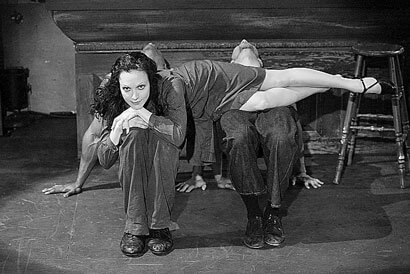A chilly Kurt Weill revue at the Zipper nonetheless offers pleasures
The woman collapses to the floor, all but broken, when suddenly the harsh lights fade and a warm spotlight appears. Jenny walks into it, stepping out of her plain sack dress and into a black satin negligee. Grabbing an old-school 1940s microphone by the neck, she magically blossoms into the chanteuse we were all hoping she was. What emerges, in a night that casts a semi-jaundiced and sentimental eye on love, is the picture of a down-and-out Everywoman clinging to whatever shreds of glamour she can still muster.
If the identity of Jenny ultimately remains opaque, one imagines that’s exactly what was intended by this revue’s creators, who, in addition to Neuwirth, include choreographer Ann Reinking and director Roger Rees. Brecht was of course Weill’s most famous collaborator, and there is more than a dash of an alienation effect at play. Neuwirth sings some of the evening’s first songs from behind the grilled window of a stage door; much of the medley that follows she sings with her back to the audience. Theatergoers wanting to be seduced into an evening of decadent but ultimately heartwarming cabaret will be disappointed.
I’m not one of those people, but still I found “Here Lies Jenny” at times more frustrating than rewarding. Kurt Weill, with his—and his collaborators’—hard-eyed views of sex and romance, has all the makings for a perfect night’s entertainment, especially for a show starting in a down-in-the-mouth part of town at 11 p.m.
Meanwhile, Neuwirth, with her stylized, ruefully cool demeanor, is on paper well-suited to the terrain. Still best known as the uber-intellectual psychiatrist from the TV shows “Cheers” and “Frasier,” she is an accomplished musical comedy star, especially in works by Bob Fosse, which have garnered her two Tonys (for “Sweet Charity” and “Chicago”). World-weary, sharp, vulnerable without being soft—a Weill heroine is one tough cookie, and so is Bebe.
Yet for all her abundant stage talents, Neuwirth doesn’t possess a luminous singing voice, essential for this stripped-back staging (just piano and voice). Of course, neither did Lotte Lenya, Weill’s wife and chief interpreter, who, after Weill’s death, was largely responsible for reviving interest in the composer. Lenya inevitably overshadows any subsequent Weill performance—and it’s for this reason, perhaps, that the creators omitted “Pirate Jenny,” the most famous Weill song, despite its offering the most obvious clue to her character.
But where Lenya’s shredded pipes were plangent testimony to a life full of hard knocks, Neuwirth’s rasp seems more the effect of too many performances (or maybe too much Pilates—Neuwirth’s legs are fantastic). As a singer, Neuwirth is never less than good, but she’s only wonderful when she’s dancing Reinking’s minimal but inventive choreography. Only then does she lose the self-consciousness that plagues her performance.
Then there is the issue of Rees’ staging. Weill may be the coolest of musical theater composers, but he is never pretentious. “Here Lies Jenny” unfortunately toes that line, especially in the first third of the show. Clutching her collar and sending her saucer eyes ceilingward, Neuwirth seems to be channeling Falconetti’s Joan of Arc rather than Brecht’s Jenny. The effect is not unlike that of filmmaker Guy Maddin (“The Saddest Music in the World,” “Dracula”), whose ironic take on silent era theatrics has a campy appeal. What “Here Lies Jenny” lacks is the archness that makes Maddin’s work so charming. The melodrama in “Here Lies Jenny” is hollow, as it is in Maddin’s work, but Rees and company seem to want us to take it straight. But without a story, there’s little emotional ballast to pull us in.
Still, there are a number of musical delights, from a somewhat revisionist, and politically relevant, “Ballad of the Soldier’s Wife” to the lesser-known gems including “I’m a Stranger Here, Too” and “Susan’s Dream.” Gregory Butler and Shawn Emamjomeh are fine in their roles as the tough-guy Johnnies, and Ed Dixon is absolutely wonderful as the genial bar proprietor, sometime husband and silent emcee. His baritone, which soars beautifully into tenor range, is richly sonorous, his characterizations casual and relaxed—a nice counterpoint to Neuwirth’s steely energy.
Faults aside, it’s hard not to recommend a show devoted to Kurt Weill. For all its off-putting chilliness, “Here Lies Jenny” offers a unique and polished evening at the theater. If you have the means, check it out. But those seeking a more echt Weimar experience should make a point to catch Ute Lemper at Joe’s Pub the next time she’s in town; her show displays some of the corniness of the traditional cabaret form, but she’s still the bee’s knees among contemporary Weill interpreters. And do buy a copy of “Three Penny Opera”—either in English or German—with Lenya in it. The life she gave Jenny makes a show like this one possible.


































